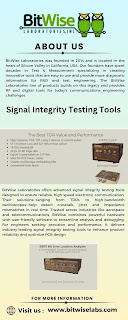Test Insertion Loss with Precision at Bitwise Laboratories
Insertion loss is a critical factor in determining the
performance of RF and microwave components. It measures the amount of signal
power lost when a signal passes through a device, and high insertion loss can
significantly impact the efficiency and reliability of electronic systems. At
Bitwise Laboratories, we offer precise testing solutions to test insertion loss, providing detailed
insights into component performance and helping clients optimize their designs.
What is Insertion Loss?
Insertion loss refers to the reduction in signal power that
occurs as a signal travel through a component, such as a cable, connector,
filter, or amplifier. It is typically expressed in decibels (dB), with higher
insertion loss indicating greater power loss. This parameter is vital in
assessing system performance, as excessive insertion loss can result in
degraded signal quality, poor energy efficiency, and reduced functionality of
electronic devices.
Accurate insertion loss testing helps designers and
engineers identify inefficiencies, verify design specifications, and ensure
product reliability. It is particularly important in high-frequency
applications, where even minor losses can have a significant impact on overall
system performance.
Why Test Insertion Loss?
Conducting insertion loss testing provides several critical
benefits:
- Improved
System Efficiency: Understanding and minimizing insertion loss ensures
better energy transfer and stronger signal integrity.
- Design
Verification: Testing helps confirm that components meet their intended
design specifications and performance goals.
- Quality
Assurance: Insertion loss testing ensures consistency and reliability in
production, maintaining high product standards.
- Regulatory
Compliance: Many industries require components to meet specific
performance standards, making insertion loss testing an essential step in
compliance.
By accurately measuring and analyzing insertion loss, you
can identify problem areas early in the design process and make necessary
adjustments to optimize performance.
Our Testing Capabilities
At Bitwise Laboratories, we utilize cutting-edge equipment
and methodologies to provide reliable insertion loss testing services. Our
state-of-the-art vector network analyzers (VNAs) allow us to precisely test insertion loss across a wide range
of frequencies, from a few megahertz (MHz) to several gigahertz (GHz). Whether
you’re testing RF cables, connectors, or more complex components, we ensure
accurate and repeatable results.
Our testing process adheres to industry standards, giving
you confidence in the quality and reliability of the data we provide. We also
work closely with clients to develop tailored testing solutions that address
specific challenges, whether for prototype development, design verification, or
high-volume production testing.
Industries We Serve
Bitwise Laboratories supports a wide range of industries,
including:
- Telecommunications:
Ensuring efficient signal transmission and reliable connectivity.
- Aerospace
and Defense: Testing mission-critical components for high-performance
applications.
- Automotive:
Optimizing in-vehicle communication and infotainment systems.
- Consumer
Electronics: Enhancing the performance of everyday electronic devices.
Partner with Bitwise Laboratories
Insertion loss testing is essential for achieving
high-performance system designs, and Bitwise Laboratories is your trusted
partner for precise, reliable measurements. Our expertise, advanced technology,
and commitment to quality help you stay ahead in today’s competitive market.
Contact us today to learn more about how we can help you test insertion loss and achieve your
design goals.
For more information
Visit us : https://bitwiselabs.com/



.png)
Comments
Post a Comment